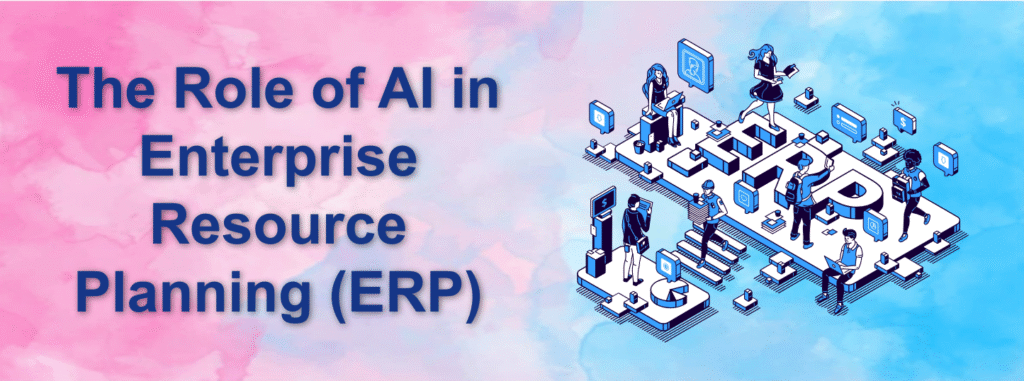The Role of AI in Enterprise Resource Planning (ERP)

Artificial Intelligence (AI) is no longer just a buzzword—it is a transformative force across industries. One of the most significant areas where AI is making an impact is in Enterprise Resource Planning (ERP). These systems, which integrate key business functions, are being revolutionized by AI technologies. By adding intelligence to ERP, companies can enhance automation, accuracy, and overall agility.
What Is ERP and Why Does AI Matter?
Enterprise Resource Planning (ERP) is a software system used to manage business activities such as accounting, procurement, project management, and manufacturing. Traditionally, ERP systems operated on static rules and manual inputs. However, with the introduction of AI, ERP has become more intelligent and responsive.
AI allows ERP platforms to learn from patterns, automate decisions, and improve outcomes over time. As a result, businesses can make faster and smarter decisions.
Key Benefits of AI in ERP Systems
1. Enhanced Decision-Making
To begin with, AI significantly improves the decision-making process. Using machine learning and predictive analytics, ERP systems can analyze massive amounts of data to uncover patterns and generate insights. Consequently, managers can make proactive decisions based on trends rather than reacting to problems after they arise.
2. Automated Routine Processes
In addition, AI automates repetitive and time-consuming tasks such as payroll processing, invoice matching, and report generation. By doing so, it reduces human error and frees up employees to focus on higher-value activities. Moreover, automation leads to consistent and accurate results across departments.
3. Improved Customer Experiences
Thanks to AI, ERP systems can now deliver more personalized customer experiences. Integration with customer relationship management (CRM) tools means that AI can analyze behavior and preferences. Therefore, companies can offer tailored solutions and respond to customer inquiries faster through AI-powered chatbots and virtual assistants.
4. Smarter Forecasting and Inventory Management
Another major advantage of AI in ERP is its forecasting capability. AI examines historical data, market trends, and seasonality to predict future demand. As a result, inventory levels can be optimized, reducing both stockouts and overstock situations.
5. Real-Time Reporting and Analytics
Traditional reporting methods often lead to delays. In contrast, AI enables real-time analytics by continuously processing and visualizing data. This allows decision-makers to access up-to-date reports anytime, thereby making fast, informed choices.
6. Risk Detection and Anomaly Alerts
Furthermore, AI algorithms can identify anomalies in data that may suggest fraud, system failures, or compliance breaches. Detecting these issues early reduces risk and allows organizations to respond promptly.
How AI Impacts Core ERP Modules
AI doesn’t just enhance ERP systems on a surface level—it transforms how core departments operate. Let’s explore how different modules benefit:
Finance and Accounting
In finance, AI can automate tasks such as financial reconciliation, expense tracking, and budgeting. For example, it can flag suspicious transactions and suggest ways to optimize cash flow. Also, predictive modeling helps in forecasting financial trends and identifying potential pitfalls.
Human Resources (HR)
When it comes to HR, AI assists in screening candidates, analyzing employee engagement, and automating onboarding processes. Tools powered by natural language processing (NLP) can even conduct initial interviews. As a result, recruitment becomes faster and more objective.
Supply Chain Management
AI greatly enhances supply chain visibility. It monitors supplier performance, predicts demand fluctuations, and recommends optimal procurement strategies. Moreover, real-time tracking of shipments and intelligent routing minimize delays and costs.
Manufacturing and Production
In manufacturing, predictive maintenance is a game-changer. AI tracks machine usage and predicts equipment failure before it happens, thus reducing downtime. Additionally, AI optimizes production schedules based on demand and resource availability.
Sales and Marketing
Sales teams benefit from AI through customer segmentation, personalized campaigns, and lead scoring. These systems analyze customer behavior to recommend the right products at the right time. Consequently, conversion rates improve and customer satisfaction increases.
Challenges in Implementing AI in ERP
While the benefits are clear, integrating AI into ERP does come with challenges.
Data Quality and Integration
One major hurdle is ensuring high-quality data. AI algorithms rely on clean, structured, and integrated data sources. Unfortunately, many legacy systems lack this, requiring significant restructuring before AI can be effectively implemented.
Change Management
Another issue is resistance to change. Employees may find it difficult to adjust to new AI-driven workflows. Therefore, effective training and communication are critical to successful implementation.
High Costs and Infrastructure
AI-enabled ERP solutions often involve higher initial costs and infrastructure upgrades. Although the long-term ROI is substantial, businesses need to evaluate if they’re ready for the investment.
Security and Compliance
Lastly, handling sensitive data through AI systems demands strong cybersecurity measures. Ensuring compliance with data protection regulations like GDPR is essential to avoid penalties and maintain customer trust.
Trends Shaping the Future of AI in ERP
Looking ahead, AI will continue to evolve and deepen its role in ERP. Here are a few emerging trends:
Conversational ERP
Voice-activated assistants and chat-based interfaces will become more common, allowing users to interact with ERP systems using natural language. This enhances accessibility and speeds up operations.
Hyperautomation
AI combined with robotic process automation (RPA) and low-code platforms will drive hyperautomation. Businesses will automate end-to-end workflows, from procurement to payroll, resulting in greater efficiency.
AI-as-a-Service (AIaaS)
Cloud-based AI tools integrated into Enterprise Resource Planning ERP platforms are making intelligent features accessible to even small and mid-sized businesses. This democratization of AI is accelerating its adoption.
Self-Healing Systems
In the near future, ERP systems may fix bugs or performance issues automatically, without human intervention. These “self-healing” systems improve uptime and ensure smoother business operations.
Final Thoughts
To sum up, AI is not just an upgrade to ERP systems—it’s a revolution. By making ERP platforms smarter, faster, and more intuitive, AI helps businesses operate more efficiently and respond to challenges with agility. Although the path to AI adoption involves challenges, the long-term benefits far outweigh the hurdles.
Therefore, companies that embrace AI in ERP today are setting themselves up for sustained growth, operational excellence, and competitive advantage in tomorrow’s digital economy.
USEFUL LINKS:
https://awaraj.com/erp-software-development/
https://awaraj.com/ai-driven-erp-solutions/
https://awaraj.com/enterprise-software-integration/

